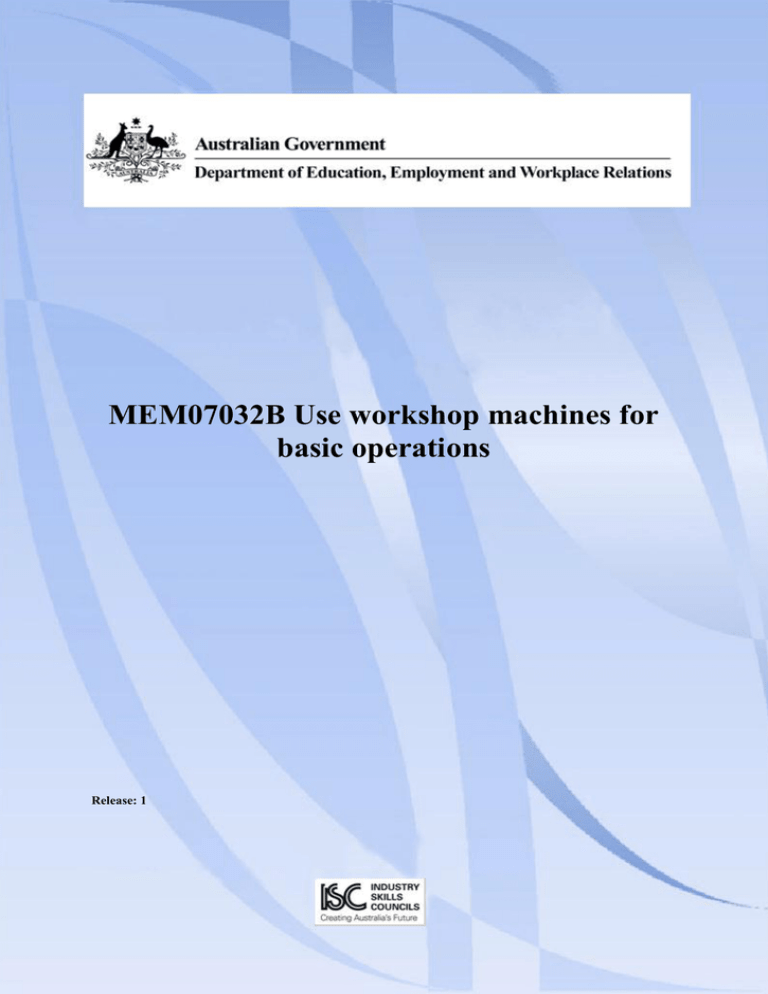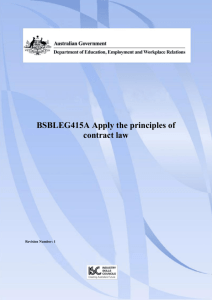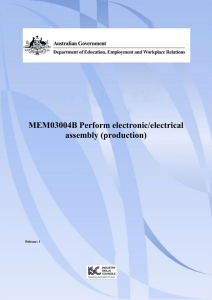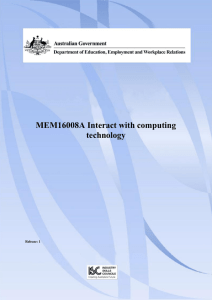MEM07032B Use workshop machines for basic operations
advertisement

MEM07032B Use workshop machines for basic operations Release: 1 MEM07032B Use workshop machines for basic operations Date this document was generated: 27 May 2012 MEM07032B Use workshop machines for basic operations Modification History Not Applicable Unit Descriptor Unit descriptor This unit covers basic machining in a maintenance or jobbing environment. Application of the Unit Application of the unit The unit applies to machines that include but are not limited to lathe, radial arm drill, mills etc., and covers the sharpening of tools as required. This unit should not be selected when Unit MEM07005C (Perform general machining) or Unit MEM07024B (Operate and monitor machine/process) have already been selected. For hand held/power tools use Unit MEM18002B (Use power tools/hand held operations). Band: A Unit Weight: 2 Licensing/Regulatory Information Not Applicable Pre-Requisites Prerequisite units Path 1 Approved © Commonwealth of Australia, 2012 MEM18001C Use hand tools Page 2 of 8 Manufacturing Skills Australia MEM07032B Use workshop machines for basic operations Date this document was generated: 27 May 2012 Employability Skills Information Employability skills This unit contains employability skills. Elements and Performance Criteria Pre-Content Elements describe the essential outcomes of a unit of competency. Approved © Commonwealth of Australia, 2012 Performance criteria describe the performance needed to demonstrate achievement of the element. Where bold italicised text is used, further information is detailed in the required skills and knowledge section and the range statement. Assessment of performance is to be consistent with the evidence guide. Page 3 of 8 Manufacturing Skills Australia MEM07032B Use workshop machines for basic operations Date this document was generated: 27 May 2012 Elements and Performance Criteria ELEMENT PERFORMANCE CRITERIA 1. Identify job requirements. 1.1. Job requirements are interpreted from work instructions and standard operating procedures. 1.2. Appropriate machine is selected to meet requirements. 2. Set up machine 2.1. Tools are selected appropriate to the work requirements. 2.2. Cutting tools are sharpened as required. 2.3. Tools are correctly installed using standard operating procedures. 2.4. Guards are set and adjusted as required. 3. Operate machine 3.1. Material to be machined is mounted and secured using clamping device appropriate to the material and work requirements. 3.2. Machine is operated correctly to suit work and material requirements. 4. Check finished component 4.1. Machined component is checked against work requirements and predetermined finish. Required Skills and Knowledge REQUIRED SKILLS AND KNOWLEDGE This section describes the skills and knowledge required for this unit. Required skills Look for evidence that confirms skills in: reading, interpreting and following routine and familiar information on written job instructions, standard operating procedures and other applicable reference documents selecting the appropriate machine for the given task setting up machines and tooling within the scope of this unit, including speeds and feeds sharpening tools within the scope of this unit operating machines within the scope of this unit checking finished components checking and clarifying task-related information Approved © Commonwealth of Australia, 2012 Page 4 of 8 Manufacturing Skills Australia MEM07032B Use workshop machines for basic operations Date this document was generated: 27 May 2012 REQUIRED SKILLS AND KNOWLEDGE measuring components to specification within the scope of this unit Required knowledge Look for evidence that confirms knowledge of: cutting tool sharpening methods and techniques tool geometry within the scope of this unit units of measurement, tool geometry and numerical operations within the scope of this unit safe operation of tool sharpening equipment consequences of incorrect sharpening machine set-up consequences of incorrect speeds and feeds procedures for operating workshop machines reasons for poor surface finish. hazards and control measures use and application of personal protective equipment safe work practices and procedures Approved © Commonwealth of Australia, 2012 Page 5 of 8 Manufacturing Skills Australia MEM07032B Use workshop machines for basic operations Date this document was generated: 27 May 2012 Evidence Guide EVIDENCE GUIDE The evidence guide provides advice on assessment and must be read in conjunction with the performance criteria, required skills and knowledge, range statement and the Assessment Guidelines for the Training Package. Overview of assessment A person who demonstrates competency in this unit must be able to use workshop machines for basic operations. Competency in this unit cannot be claimed until all prerequisites have been satisfied. Critical aspects for assessment and evidence required to demonstrate competency in this unit Assessors must be satisfied that the candidate can competently and consistently perform all elements of the unit as specified by the criteria, including required knowledge, and be capable of applying the competency in new and different situations and contexts. Context of and specific resources for This unit may be assessed on the job, off the job or a combination of both on and off the job. Where assessment assessment occurs off the job, that is the candidate is not in productive work, then an appropriate simulation must be used where the range of conditions reflects realistic workplace situations. The competencies covered by this unit would be demonstrated by an individual working alone or as part of a team. The assessment environment should not disadvantage the candidate. This unit could be assessed in conjunction with any other units addressing the safety, quality, communication, materials handling, recording and reporting associated with using workshop machines for basic operations or other units requiring the exercise of the skills and knowledge covered by this unit. Method of assessment Approved © Commonwealth of Australia, 2012 Assessors should gather a range of evidence that is valid, sufficient, current and authentic. Evidence can be gathered through a variety of ways including direct observation, supervisor's reports, project work, samples and questioning. Questioning techniques should not require language, literacy and numeracy skills beyond those required in this unit of competency. The candidate must have access to all tools, equipment, materials and documentation required. The candidate must be permitted to refer to any relevant workplace procedures, product and manufacturing specifications, codes, standards, manuals and reference materials. Page 6 of 8 Manufacturing Skills Australia MEM07032B Use workshop machines for basic operations Date this document was generated: 27 May 2012 EVIDENCE GUIDE Guidance information for assessment Range Statement RANGE STATEMENT The range statement relates to the unit of competency as a whole. It allows for different work environments and situations that may affect performance. Bold italicised wording, if used in the performance criteria, is detailed below. Essential operating conditions that may be present with training and assessment (depending on the work situation, needs of the candidate, accessibility of the item, and local industry and regional contexts) may also be included. Machines Lathe, radial arm drill, mill etc. Cutting tools Lathe tools, milling cutters, drills etc. Materials Ferrous and non ferrous Clamping device Chucks, vices, clamps, bars and packing etc. Unit Sector(s) Unit sector Co-requisite units Co-requisite units Approved © Commonwealth of Australia, 2012 Page 7 of 8 Manufacturing Skills Australia MEM07032B Use workshop machines for basic operations Date this document was generated: 27 May 2012 Competency field Competency field Approved © Commonwealth of Australia, 2012 Machine and process operations Page 8 of 8 Manufacturing Skills Australia





